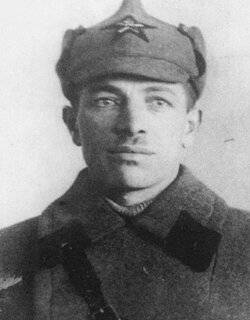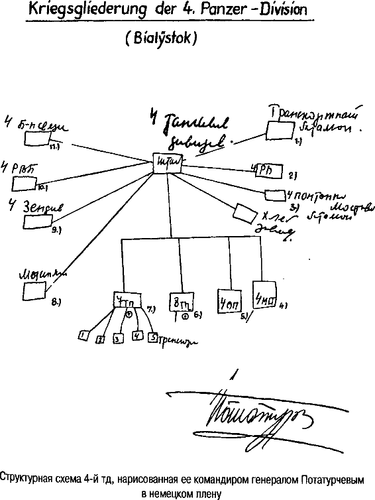Repressions of 1941 in the Red Army

Repression is a sore topic for our people even after 90 years, and the topic, alas, is largely politicized. At first they denied repressions, then they rehabilitated the convicts en masse, then hushed up, and then again ...
There were repressions, and there were innocent convicts, even the most ardent supporter of Stalin cannot but admit that the arrests of people like Rokossovsky or Gorbatov are stupidity on the verge of betrayal.
But not everyone was judged and just like that, especially in the cases of 1941, when in a supercritical situation it was clearly manifested what kind of person is inside, and whether there is a core in him. And, alas, not all pre-war generals had a core.
Major General Potaturchev

A career, in principle, typical for that time - an ordinary artilleryman in the First World War, four classes of education (at that time it was pretty good, at the level of our secondary school), the Red Army in the Civil, a party school, an anti-aircraft artillery school. One of the young cadres who were supposed to replace the tsarist generals and commanders of the Civil War.
Career advancement is also fast - already in 1930 he was a student of the Faculty of Mechanization and Motorization of the Military Technical Academy. F.E.Dzerzhinsky. From May 1932 to May 1935 - student of the Military Academy of Mechanization and Motorization of the Red Army named after V.I. I. V. Stalin. Further - the battalion commander and brigade commander of the 21st heavy tank brigades, elites of the Ground Forces of the Red Army. Combat experience, however, not very: The liberation campaign in Western Belarus is not a war.
And in the summer of 1940, he was appointed commander of the Fourth Panzer Division - one of the strongest and oldest armored divisions of the Red Army. Most of them were formed in 1941 and entered the battle without even completing their formation, and Potaturchev's division was of the first wave, from those whom they managed to form, equip and where they could even take a course of combat training. Actually, the Sixth Mechanized Corps of Khatskilevich itself, which included the division, was staffed normally, by the standards of the Red Army in 1941 - just excellent. At Potaturchev's disposal were only the newest tanks: 88 - T-34 and 63 - KV, manning was almost one hundred percent (10 people), transport - 900%.
And then there was the war and the Bialystok cauldron, where the Sixth Mechanized Corps and the Fourth Tank Corps disappeared.
The fate of the commanders was different: Boldin, who headed the KMG, with a small group left the encirclement, Khatskilevich led the breakthrough and died, and Potaturchev ...
During the years of perestroika, his widow told the following history:
The hero was rehabilitated immediately after Stalin's death, his wife received a pension.
It's beautiful, it's a pity that it's not true, and everything: from a to z.
First, Potaturchev, leaving the unit entrusted to him, changed into civilian clothes and really walked towards the front, where he was captured by a German patrol in Minsk, becoming the first captured Soviet general.
Second:
After leaving his troops, he wanted to try to get through Slonim, Baranovichi and Bobruisk to Smolensk, and from there to Moscow. He recognized the possibility that when he arrived in Smolensk, Moscow would have already fallen, and intended in this case to move to his family. When asked about the family, he began to cry and asked to be taken out of the room.
From a purely human point of view, you can understand, after the defeat broke down and fled, being captured by the Germans, split and said what he knew and what, from his point of view, the Germans might like:
And the conclusion of the Germans:
You can argue with this or not, but you can read:
Criminal Code.
Again, in those conditions it was easy to break down, the Western Front survived a catastrophe, and this is a fact. Potaturchev is not guilty of the catastrophe, he is rather a victim. But...
Law is law, and Potaturchev's colleagues perished, broke out of the encirclement with groups of their fighters, but did their duty.
At the same time and in the same places, another general, Karbyshev, was captured, who preferred death to shame. And he is not alone, the number of soldiers and officers of the Red Army who fought to the end is enormous. Otherwise, we would not have won the war.
But Potartuchev broke down, an ordinary soldier can be sent to a penal company for this, what to do with the general?
He was arrested, in 1947 he died in prison, before he was tried and executed.
I don't see a monster in him, a traitor - too, just an ordinary person who has chosen the wrong profession. But this does not relieve him of responsibility, especially since he really violated the law.
Major General Chernykh
As a division commander in the Bialystok ledge, he was brought to a village near Bryansk - a little later. In the meantime, about the landing - in addition to panic, Citizen Chernykh ordered the destruction of materiel in Sesche ...
He ordered and rushed to Bryansk shouting "Germans", which disorganized the front-line city.
What happened, in principle, is clear - a young officer born in 1912, appointed to command the division:
I screwed up my job, because I had neither the experience nor the talents of the genius level. On the first day of the war, he was confused and did not disperse the regiments entrusted to him, then he evacuated with those who survived to the rear for rearmament, where he finally fell through.
At the same time, Sergei Chernykh is a combat pilot with experience in fighting in Spain and a skilled fighter, like his boss, also from Rychagov's team, General Kopets. Just the rapid career of Rychagov, who pulled behind him the same young and early, sincerely believing that they know what is best, led to what it led to: a third of the MIGs of the Red Army was lost, the division commander fell into a panic and was shot.
Under Khrushchev, he was rehabilitated - after all, Stalin was personally guilty of everything ...
Without denying the guilt of Comrade Stalin, who staked on the youth, but Major General Chernykh was not appointed by force, did anyone?
Did the security officer with a revolver stand behind when he received the front-line division?
Privates were shot for panic in wartime: we, the Germans, the Americans and the British. And the demand from the general, in my humble opinion, is much higher.
At the same time, he was not a traitor to Black, nor was he a coward. If he was in command of a regiment at the age of 29, and the Germans would see Kuz'kina's mother in the sky, as they saw in the performance of, say, Lev Shestakov, the regiment commander in Odessa, who did not jump above his head after Spain. Or other Spaniards who fought bravely and skillfully ... At their level.
Colonel Alekseev
July 9 p. The division commander Alekseev, having a written order from the Front Military Council - to hold the occupied positions, on the basis of an alleged oral order from the commander of the 7th rifle corps Dobroserdov, the 492nd rifle regiment, which had all the capabilities to hold the line defenses until the arrival of reinforcements, ordered to withdraw. This order was not passed on to the rest of the regiments. Division commander Alekseev, along with commissar Korzhev and other commanders, leaving the units, fled from the battlefield. In the area where the division headquarters was located, on July 11, all the office work of the division headquarters and about 2 million money were found abandoned.
Moskvich, 44 years old, career commander of the Red Army. Having brought far from the best division (formations of 1941) to position, he was confused and:
After occupying the defense area, the division command did not reconnoitre the enemy forces, did not take measures to blow up the bridge over the Sluch River in the central defense sector, which made it possible for the enemy to transfer tanks and motorized infantry. Due to the fact that the command did not establish contact between the division headquarters and the regiments, on 6 July the 617th and 584th rifle regiments operated without any direction from the division command.
In panic, he did not fulfill the elementary things for the divisional commander, which led to the defeat, conviction and execution on December 27, 1941, with further rehabilitation during the time of Khrushchev.
It happened, of course, in different ways, repression is also a dubious method of restoring order. Here is the Northwest Front:
Then the corps commander set up his divisional commander, he got off with a sentence of 10 years, served a year, and was reinstated in rank. Divisional commander Glovatsky was shot and rehabilitated posthumously, which is little consolation.
But you must understand that time - this is the period when people died in the Brest Fortress, but did not surrender, when the pilots rammed, when civilians were enrolled in the militia, and the absolute majority of commanders fought to the last.
As an example of the mood of the time:
And in such conditions it was necessary to punish alarmists.
Well, after the war ...
The commander of the 5th Army, Major General Potapov, after captivity continued to serve, for example, and he was not alone. He simply did not testify, did not surrender military secrets, did not cooperate with the Germans.
22 generals were restored to the rank, 6 more escaped from captivity, 28 died, only eight out of 81 went over to the side of the Germans.
With regard to rehabilitation - there is a law, there is a private opinion, each has its own.
My point is that the time has not yet come to issue final verdicts, but the rehabilitation of everyone without exception is also not a method. Our era and understanding of justice are too different from that era.
Information